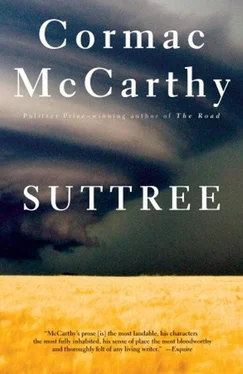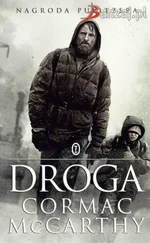One night Suttree said to him: Dont you have any family?
The lights were out. A few bodies shifted in the dark. Dont you? said the small voice overhead.
Christmas came and some of the married prisoners were furloughed home to holiday with their families. A few were released. Slusser came from solitary, the pick still on his leg. He entered with his blanket and went down the aisle without speaking to anyone.
There was a lighted tree in the recreation room downstairs and on Christmas day they had turkey with all the trimmings. Callahan in the kitchen drunk making pumpkin pies out of old sweet potatoes and carrots. Sots loose from the drunk tank wandering about crazed with thirst. An air of wary joy, like Christmas in some arctic outpost.
The following day was Sunday. Suttree was playing poker when his name was called. He played on.
That’s you, Suttree.
He folded his cards. He glanced toward the door and rose heavily, handing the cards down to Harrogate. Dont lose all my money, he said.
The hall guard opened the door and he went out and down the stairs.
The messhall was filled with families. Enormous baskets of fruit. Country people, some bewildered, some in tears. Old men who had been here themselves perhaps.
Over yonder, said Blackburn.
She was sitting at the table at the far end of the hall. Quietly in her good clothes. He turned to go back but Blackburn gripped him by his sleeve and pulled him around. You get your ass over there, he said.
He made his way along the edge of the table. She had her purse in her lap and she was looking down. She was still wearing her hat from church. He sat down on the bench across the table from her and she looked up at him. She looked old, he could not remember her looking so. Her slack and pleated throat, the flesh beneath her jaws. Her eyes paler.
Hello Mother, he said.
Her lower chin began to dimple and quiver. Buddy, she said. Buddy …
But the son she addressed was hardly there at all. Numbly he watched himself fold his hands on the table. He heard his voice, remote, adrift. Please dont start crying, he said.
See the hand that nursed the serpent. The fine hasped pipes of her fingerbones. The skin bewenned and speckled. The veins are milkblue and bulby. A thin gold ring set with diamonds. That raised the once child’s heart of her to agonies of passion before I was. Here is the anguish of mortality. Hopes wrecked, love sundered. See the mother sorrowing. How everything that I was warned of’s come to pass.
Suttree began to cry nor could he stop it. People were looking. He rose. The room swam.
Buddy, she said. Buddy.
I cant, he said. Hot salt strangled him. He wheeled away. Blackburn would have stopped him at the door but when he saw his face he let him go. Suttree jerked his arm away and went through the gate and up the stairs.
He was released a few days later on order from Judge Kelly. The country mouse had run off from a work detail the morning before and as Suttree came from the supply room dressed in the clothes he’d worn through the slam seven months earlier Harrogate was being led clumping along the hall with a pick on his leg. They exchanged glances as they passed but you couldnt say it in words. Suttree was taken back to town in the same car that had brought him out. It was snowing but the roads were clear.
He woke in the logy heat of full summer noon with the sun beating on the tin roof above him and raising a sour smell out of the old wood of the cabin. He could hear the howl of the saws in the lumbermill across the river and he could hear the intermittent scream of swine come under the knacker’s hand at the packing company. He turned his face to the wall and opened one eye. Watched through a split in the sunriven boards the slow brown neap of the passing river. After a while he struggled up, blinking in the dusty slats of sunlight that sliced through the hot murk. He tottered erect onto the floor in the trousers he’d slept in and made his way to the door and stepped out, scratching his naked belly, watching the boards for stray fish hooks as he went barefoot toward the rail. He leaned on his elbows and looked out over the river. The skiff had sunk to the gunwales and lay quietly awash in the current. He propped up one foot and studied his toes. He could hear everywhere in the hot summer air the drone of machinery, the lonely industry of the city. He blinked and stretched. A graveldredger was moving upriver, her pipes and tackle slung up in the trucks. He watched it pass. A figure on the pilot deck waved and he waved back.
Suttree took the rope loose from the rail and began to haul the skiff along the side of the houseboat. It yawed and wallowed in the river. He threw the rope ashore and went down the plank and retrieved it from the mud and miring to his anklebones he eased the skiff in. He got hold of the ring in the prow and braced himself and lifted. Mud spurted between his toes. He hoisted the front of the skiff and watched the water sluice heavily over the transom into the river. Tails flared and subsided. He hauled the skiff partly up the bank and lifted it sideways. The trapped fish milled and surged. He tilted with care, their shapes riding up along the overflow and dropping back again. When he lowered the skiff they lay gaping on the boards under a sun that withered them visibly.
Suttree gripped his forepockets, searching. He rose and went to the shanty and returned with a large claspknife. He reached into the bottom of the boat and brought up a catfish by the lower jaw. It quivered slightly and curled its tail. Suttree turned it and sank the point of his knife into its throat and opened its wet and pale blue belly with a clean slicing motion that dumped forth the living viscera down his forearm in a welter of dark blood. He seized these entrails and hauled them from the fish and slung them, a wet anneloid mass writhing brightly in the sun and dropping through the placid face of the river with a light splash that sucked away almost at once. He laid the cleaned fish by and seized the next. They were seven in all and he had them dressed in minutes and aligned in the shade under the skiff’s seat. He cut the leaders from the hooks he’d salvaged and he rinsed the blood and mucus from his hands and cleaned the knife and folded the blade away and returned to the shanty.
When he came out again he wore a shirt loosely unbuttoned and he had a towel over one shoulder and he carried a small porcelained basin and a leather shavingbag. He came down the plank walk and went across the field toward the warehouse still barefoot and stepping carefully, emerging onto the railbed and walking three tentative steps on the hot steel before hopping off again. He did a little hotfoot dance and went on among the cinders and rough ties. Passing through a landscape of old tires and castoff watertanks rusting in the weeds and bottomless buckets and broken slabs of concrete. When he left the roadbed he turned up along the side of the warehouse, the new tin brightly galvanized and reeling in the enormous heat and his shadow wincing blackly across the corrugated glare of it like a crepepaper player in a shadowshow. At the far end of the warehouse was a brass spigot. Beneath it the cracked red clay lay shaped in a basin centered by a dark ocherous eye where the water dripped. Suttree knelt and laid out his things, hung his small mirror from a nail, set his washbasin under the tap and turned on the water. Squinting, he inspected his beard, testing the water idly with one finger. It came hot from the tap in this weather and he laved a palmful over his cheeks and wet his brush and lathered carefully. Then he opened his razor and stropped it briefly on the side of his shavingbag and commenced to shave, pulling the skin taut with his fingers.
Читать дальше












